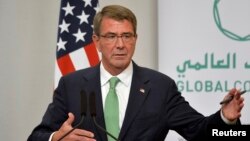The U.S. military might not shoot down a North Korean intercontinental ballistic missile test if the missile is not a threat to the U.S. or its allies, Defense Secretary Ash Carter said Tuesday.
Speaking in his final news briefing at the Pentagon before leaving office later this month, Carter told reporters the military potentially could glean intelligence on North Korea's capabilities during any test launch.
“If the missile is threatening, it will be intercepted. If it's not threatening, we won't necessarily do so, because it may be more to our advantage to, first of all, save our interceptor inventory and, second, to gather intelligence from the flight,” Carter said.
Chairman of the Joint Chiefs of Staff General Joseph Dunford agreed with the defense secretary's assessment. As the top U.S. military officer, Dunford will continue in his military post after President-elect Donald Trump takes office next week.
North Korean leader Kim Jong Un said in a televised address earlier this month that Pyongyang is in its “last stage” of preparation for testing an intercontinental ballistic missile.
Some intercontinental ballistic missiles are capable of traveling the distance from North Korea to the continental United States.
Russia Hacking
When asked about the U.S. response to alleged Russian hacking in order to interfere with the 2016 U.S. presidential election outcome, Carter hinted that more U.S. actions in response might lie ahead.
“Some responses have been made. I think you should regard that as a start and not the end,” said Carter.
President Barack Obama has issued sanctions against Russia and expelled 35 suspected Russian spies for what he called “malicious cyber-enabled activities” and for Russian harassment of U.S. diplomats in Moscow.




